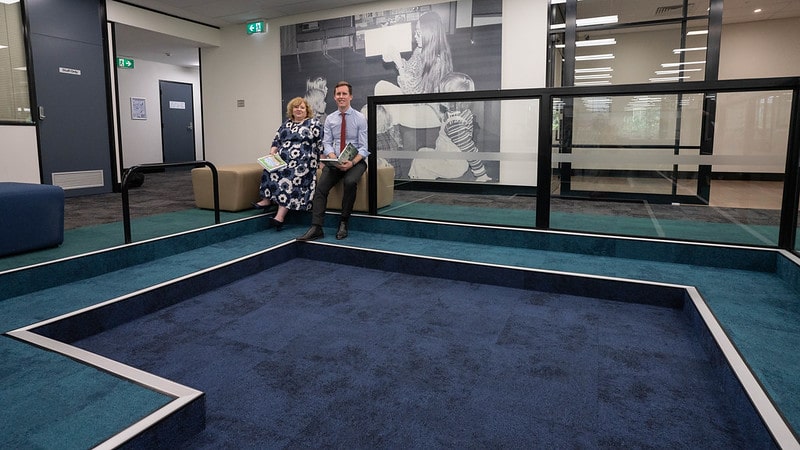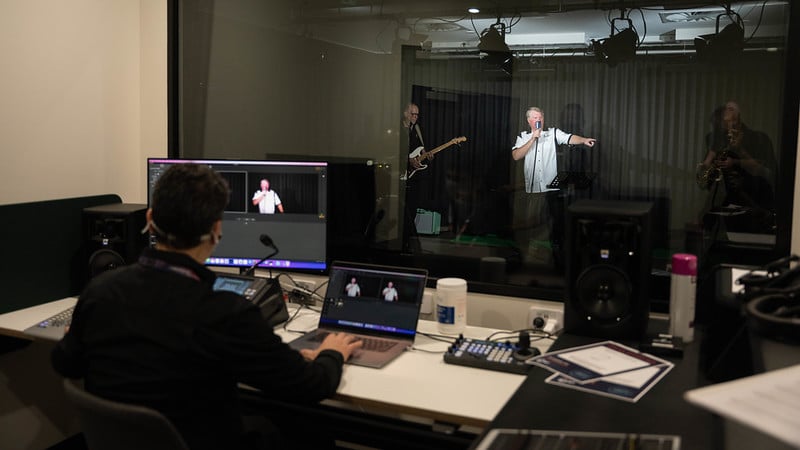A dance hall, a music recording studio, a kitchen, and a business meeting space – in a library? You may be as incredulous as Lady Bracknell, if you like – but the days of mouldering back issues of Punch and stern librarians telling readers to ‘Hush!’ are long gone. The modern library, explains Vanessa Little, Libraries ACT executive branch manager, is a community hub and a community lounge-room.
“This is very much a 21st century progression,” she said. “Libraries these days are moving towards these kinds of community facilities. While books are still really important, and we will still have lots of books, we are mixing that with other activities.”
And the revamped Woden Library is a case in point. Upstairs, where the Heritage Library used to be before it moved to Fyshwick, you will now find ‘The Hive’ (a digital hub, with recording studio, podcasting materials, and green-screen tools),’The Gathering Space’ (a meeting space for community groups and collaboration), ‘The Life Lab’ (a flexible space for learning, speeches, yoga, and dance), and ‘The Haven’ (for quiet relaxation, study, and reading).
Downstairs, there are two new meeting rooms and a kitchen, which the community can use after hours.
“Libraries are about much more than just borrowing books, study, or research,” said Chris Steel, ACT Minister for City Services. “Woden will have the community facilities it needs as it grows.”
Book club members can discuss the choice of the month over a cup of coffee; local bands can record their first hit single; and residents can dabble in clay or watercolours, galop over the library shelves and tango through the aisles, cook up a storm, or knot themselves into human pretzels at a yoga class. (Although not all at the same time.)
“A wide variety of activities in community spaces designed by the community,” Mr Steel said.
But Woden is also the ACT’s most popular library – and traditional activities like reading are thriving. When the branch reopened last week after lockdown, there were 7,000 requested items waiting to be picked up; staff spent two days building shelves to accommodate them.
“There is still a lot of demand in this town for the hard copy,” Ms Little said.

The Libraries ACT collection has over half a million items – 507,000 physical items (including in the Heritage Library) and 61,000 digital items. That doesn’t include digital subscriptions to streaming services Freegal (music) or Kanopy (films and documentaries). 63 per cent of loans are physical, and 37 per cent digital.
Even in a decade’s time, Ms Little expects a large proportion of the collection will still be ‘hard copy’; she cannot see more than half the collection being electronic in the next few years.
“Libraries are places for ideas, for information, for literacy… The fundamental for libraries hasn’t changed; the way we deliver it is changing.”
Art books or books with beautiful photographs will always be nicer in hard copy, and families do not want to lose the joy of sitting and reading a book with their children, Ms Little said.
Electronic loans are growing, however; by the end of this year, libraries will have made 875,000 electronic loans – 26 per cent more than last year, and 67 per cent more than in 2019.
But that, of course, may be due to COVID. Libraries were closed during lockdown; readers’ choice, Ms Little explains, was to read all the books they had under their bed, or to borrow electronic books.
A telephone hotline helped the tech-unsavvy download e-books and e-audiobooks. But every month, the library delivered a ‘Mystery Box’ – a Masefieldian B. of Delights rather than a Stevensonian Wrong B. – 10 items in a genre of a reader’s choice. It was a way Canberrans could stay home and still get library material.
The library expected it to be popular with older Canberrans; in fact, Ms Little said, it was overwhelmingly subscribed to by younger families: time-poor folk who wanted their kids to read lots of different books, and appreciated they could borrow rather than buy.
Young families are among the most enthusiastic library users; so too are teenagers and retirees. But people in their 20s and 30s don’t read as much as they used to; they’re too busy building careers and travelling the world. And older families often stop using the library as their children get older and more self-determined.
Woden Library’s new facilities are designed to attract those two lost age groups. The podcasting studio should appeal to ‘digital natives’; the Life Lab to people in their late 20s and 30s. (The library will also use these facilities for programs they hope will draw in more people, such as podcasts of local authors.)
When community groups come in, staff will be on hand to talk about what else the library offers. Some people aren’t aware they can borrow magazines, DVDs, or audiobooks, as well as books; the library prominently displays these at the front.
The new facilities were suggested by the public in 2019, and the government believes this is what the libraries of the future could look like. Libraries ACT is asking the public to help them design libraries fit for 2030.
Feedback so far, Ms Little said, is that the public wants to hold onto traditional reading, books, and quiet places to study, but also to move into community activities, where they can overcome isolation while embarking on lifelong learning, self-education, and discovery.
In her view, libraries will continue to be vibrant community spaces where people can learn, interact, read, and gain better literacy. The place people think about and come to when they need to solve a problem, or to learn or find out about something. Plenty of technology, but also a place for social interaction and inclusion.
“Fundamentally, libraries are about democracy,” Ms Little said. “A library makes sure that everybody has free and fair access to information so they can make good decisions, so they can be part of the political process. No libraries mean there’s a vacuum in that area, and that’s a problem for democracy.”
Get all the latest Canberra news, sport, entertainment, lifestyle, competitions and more delivered straight to your inbox with the Canberra Daily Daily Newsletter. Sign up here.



